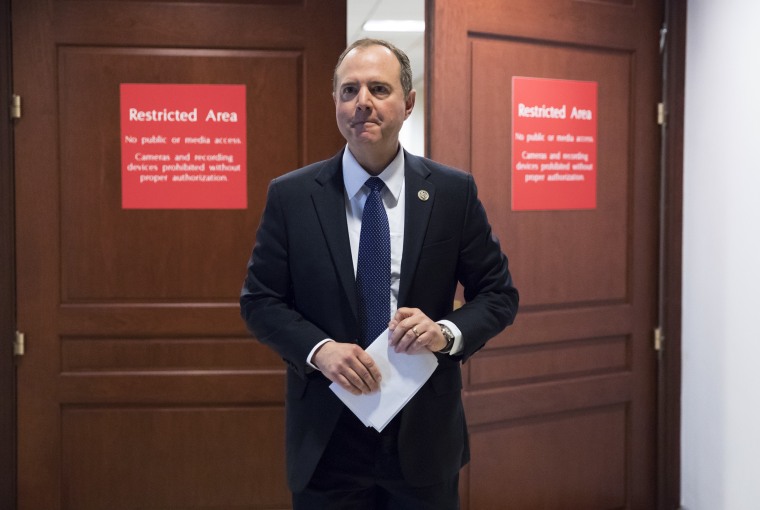WASHINGTON — When Democrats assume control of the House of Representatives in January, President Donald Trump will face something he has never before experienced: An opposition party with subpoena power whose goal is to make public every detail of the 2016 Russian election interference effort.
That fact became even more consequential Wednesday, when Trump forced out Attorney General Jeff Sessions. The departure of Sessions places the acting attorney general, Matthew Whitaker, in charge of special counsel Robert Mueller's investigation into whether Trump conspired with Russia. Deputy Attorney General Rod Rosenstein, who previously was in charge, was in that role only because Sessions had recused himself, citing his role in the Trump campaign.
Now, Whitaker, who was Sessions' chief of staff, takes the reins. Before he joined the government, he repeatedly criticized the Mueller probe, saying, for example, that Mueller should not investigate Trump's finances.
Democrats on the House Intelligence Committee have not explicitly said they would re-open the committee's Russia investigation, which was closed in March by the Republicans in charge of the committee. But they have said there are many additional questions they would like to answer.
Republicans announced they had found no evidence of Trump campaign collusion with Russia; Democrats proclaimed that a laughable whitewash. They noted that the committee had allowed Steve Bannon to dodge questions, had failed to demand relevant documents from the Trump campaign, and had not heard from key witnesses.
"We're certainly going to look at the work that we were able to do, we're going to look at the work that the GOP obstructed on our committee," Rep. Adam Schiff of California, who will chair the committee in January, said on MSNBC. "We'll have to see what Bob Mueller has been able to do and what Bob Mueller has been able to say, either via indictment or via report, and that will also guide what we intend to do in our committee."
On Wednesday, after Sessions stepped down, Schiff tweeted that "the Mueller investigation and the independence of the DOJ must be protected."
But regardless of how aggressively Schiff's committee moves to re-open its own investigation, the committee also plays another important role: Overseeing the executive branch and releasing its findings to the public.
Mueller is conducting a criminal investigation, using a grand jury that is bound by secrecy rules. He is supposed to prepare a report on his findings, but there is nothing that says that report must be made public.
The report would go to Whitaker, who could decide to stick it in a drawer.
But House Democrats could use their subpoena power to try to force the Trump administration to turn it over. They could also seek to compel witnesses to testify under oath — including, in theory, Mueller himself — about what they have found.
How much of that testimony could unfold in public would depend on how much information was classified. There is also an issue of grand jury secrecy. But there is little doubt that Democrats would seek to expose Mueller's findings, and Tuesday's election results give them the power to do so.
"We are immediately issuing multiple letters to key officials demanding that they preserve all relevant documents related to this action to make sure that the investigation and any evidence remains safe from improper interference or destruction," said Rep. Jerry Nadler, D-N.Y., the incoming chairman of the House Judiciary Committee.
The Senate Intelligence Committee, meanwhile, has been continuing to conduct its own Russia investigation, despite the House Republican findings. The Senate probe is led by a Republican, Richard Burr of North Carolina. Burr, who has said he will not run for-reelection, has not sought to protect the president at all costs, but he has also expressed skepticism about some lines of inquiry. The ranking Democrat, Virginia's Mark Warner, has been required to compromise on scope and investigative efforts to keep Burr on board, people involved have said.
House Democrats will not have to compromise — they have all the power in their chamber.
"We will conduct the investigations that Republicans won't," Intelligence Committee member Eric Swalwell, D-Calif., said on TODAY. "We'll fill in the gaps on the Russia investigations. The American people will see his tax returns, not because of voyeuristic interest, but because they should know if he is corrupt."
Schiff hasn't said exactly what more he would like to investigate, but he did detail what he recommended the committee do before Republicans closed the investigation in March.
Among the steps he said Democrats were blocked from taking:
- Compelling testimony from Sessions; Donald Trump Jr.; Trump's son-in-law, Jared Kushner; former communications director Hope Hicks and former bodyguard Keith Schiller.
- Issuing subpoenas for documents from the Trump campaign and transition and from George Papadopoulos, Carter Page, and other key persons of interest.
- Referring to the House a contempt citation for Steve Bannon, to challenge the White House's order to him not to testify about the presidential transition, his tenure at the White House, and his communications with the president since leaving the administration.
Another witness House Democrats want to talk to is Randy Credico, a longtime friend of Trump adviser Roger Stone, who is alleged to have been Stone's backchannel to WikiLeaks, which released hacked Democratic emails prior to the 2016 election.
Credico is ready, he told NBC News Wednesday.
"I'm not afraid to talk now and I would probably appear this time," Credico said. "I would be open this time around to speak to the House.... I've certainly held back a lot of the stuff I know about Stone for a while. It might be a good time to air it out. As the president says, 'Let's see what happens.'"

